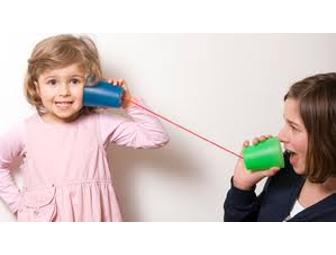a therapy connection Gift Certificate for Speech Evaluation

Item Number: 306
Time Left: CLOSED
Value: $300
Online Close: May 9, 2013 8:00 PM CDT
Bid History: 0 bids
Description
Does your child have difficulty pronouncing certain letter sounds? A speech evaluation will help you identify if a treatment plan would benefit your child.
At a therapy connection, their Speech-language pathologists (SLPs), assess, diagnose, treat, and help to prevent speech, language, cognitive-communication, voice, swallowing, fluency, and other related disorders.
They work with children who cannot produce speech sounds clearly; those with fluency problems, such as stuttering; children with voice disorders, such as inappropriate pitch or harsh voice; children with swallowing/feeding disorders; children with problems understanding and producing language; and those with cognitive communication impairments, such as attention difficulty, or memory and problem solving disorders.
a therapy connection's SLPs provide individualized assessments and treatment plans based on each child's specific needs. Areas assessed include, but are not limited to:
Pre-Language Skills: This refers to eye contact, gestural communication, facial expression, babbling/sound imitation and other nonverbal communication methods that emerge before verbal communication.
Oral Motor Skills: This refers to the strength and coordination of facial and mouth muscles for speech and feeding. Children with oral motor disorders may exhibit drooling, open mouth posture, poor control of food while eating, and unclear speech.
Feeding/ Swallowing: Children with feeding and swallowing disorders may exhibit some of the following symptoms: food/liquid falling from the mouth, difficulty chewing, difficulty sucking from a bottle/breast or straw, strong aversions to certain textures or flavors or even refusal to consume a variety of foods. SLPs can assist in weaning infants and children off of feeding tubes when appropriate.
Articulation and Phonology: This refers to the way each speech sound is produced in isolation, words, sentences, and conversation.
Language: Language is broken down into two components; Receptive and Expressive. Receptive language refers to the child's understanding of what is said to him/her. Expressive language refers to the words and gestures that a child uses to communicate.
Pragmatics: This refers to social language. Children who have difficulty with pragmatics may exhibit inappropriate behavior or inappropriate responses to others' questions or directions. They may have difficulty taking turns, making eye contact, playing well with others, or following requests.
Voice: When a child exhibits difficulty with his/her voice, including hoarseness, loudness, pitch, etc.
Fluency: Fluency therapy is for children who exhibit signs of stuttering.
Cognition: Cognition covers thinking skills such as memory, organization, planning, and problem solving. Cognitive deficits may result from brain trauma, developmental delay, and various diagnoses.
Alternate Communication: For children with little or no speech capability, we can work with the child and family to select augmentative or alternative communication methods, including automated devices and sign language, and teach their use.
You are bidding on a Gift Certificate for Speech Evaluation from a therapy connection in Richardson, Texas.
Special Instructions
Gift Certificate expires August 31, 2013.
All proceeds from this item benefit Little Saints Child Development Program.